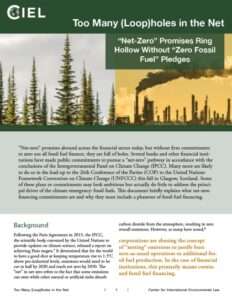
The latest Intergovernmental Panel on Climate Change (IPCC) report made clear: For the world to have a good shot at keeping temperature rise to 1.5°C above pre-industrial levels, emissions would need to be cut in half by 2030 and globally stabilize by 2050.
In accordance with the IPCC’s conclusions, several banks and other financial institutions have made public commitments to pursue a “net-zero” pathway. Many more are likely to do so in the lead-up to the 26th Conference of the Parties (COP) to the United Nations Framework Convention on Climate Change (UNFCCC) this fall in Glasgow, Scotland. Some of these plans or commitments may look ambitious but actually do little to address the principal driver of the climate emergency: fossil fuels.
Too Many (Loop)holes in the Net: “Net-Zero” Promises Ring Hollow Without “Zero Fossil Fuel” Pledges briefly explains what net-zero financing commitments are and why they must include a phaseout of fossil fuel financing.
Key Takeaways:
- Corporations are abusing the concept of “netting” emissions to justify business-as-usual operations or additional fossil fuel production. In the case of financial institutions, this primarily means continued fossil fuel financing.
- Net-zero plans must explicitly phase out fossil fuel financing, rather than relying on technologies like carbon capture and storage to “fix” fossil fuel emissions.
- Financial company net-zero plans must explicitly phase out fossil fuel financing rather than relying on offsets.
- Financial institutions’ net-zero policies must not use other tactics such as focusing on emissions intensity, ignoring financed emissions, setting vague targets, or only setting long-term targets to justify continued financing for fossil fuels.
Published on August 18, 2021
